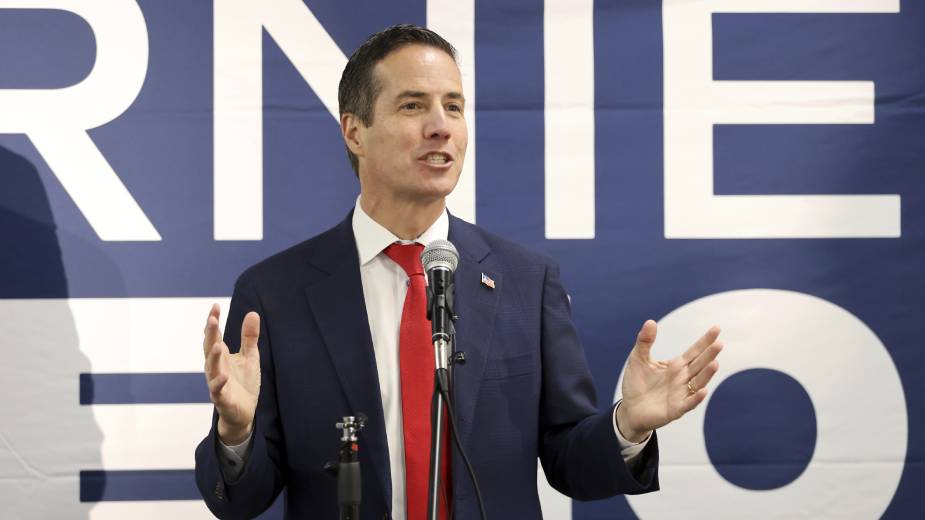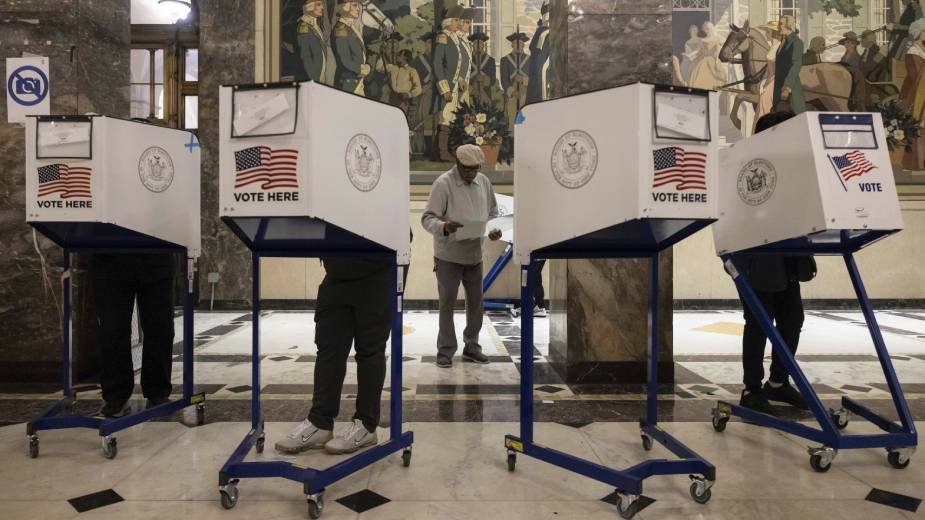Johnson Bemoans Political Dysfunction at Rotary Meeting
YOUNGSTOWN, Ohio – U.S. Rep. Bill Johnson blamed political dysfunction in Congress on attention-seeking colleagues on both sides of the aisle and members who lack life experience beyond politics.
Johnson, R-6 Ohio, was the featured speaker at Wednesday’s meeting of the Rotary Club of Youngstown.
As now configured, the 18-county congressional district the Marietta resident represents encompasses just part of the southern portion of Mahoning County. Under a new map approved by Republican lawmakers last month, the 6th district would extend up to the northern border of Trumbull County.
Johnson, who anticipated the district would be redrawn to encompass most of Mahoning County, said he was “pleasantly surprised” that the district was drawn as far north as it was.
“I have a long history here in the Mahoning Valley,” he said. He previously lived in Mahoning County and, before being elected to Congress in 2010, worked in Trumbull County for several years for a company that manufactured electronic components for the transportation sector.
Much of the congressman’s speech to the assembled Rotarians and guests – attendees included Mahoning County Probate Judge Robert Rusu and Guy Coviello, president and CEO of the Youngstown/Warren Regional Chamber – focused on the dysfunction in politics. He offered as an example of that dysfunction the fact that he and his fellow representatives left the floor of the U.S. House of Representatives around midnight.
“You would think we could get our work done and be effective and productive, and not have to work through the night to do it,” he said. “Some of my colleagues on both sides of the aisle would prefer to win the argument on the policy issue of the day rather than actually solving the problems that you folks send us there to try to solve.”
While girdlock isn’t a new problem, it seems to be getting worse, and many factors play into that, he continued.
“It seems that the more outrageous the politician can be, the easier it is to get on cable news for ratings, to raise campaign dollars, to become a household name, to have their moment in the sun. You probably have a good idea of who some of these folks are,” he said. “Neither political party has a monopoly on who those groups of people are. They come from both sides.”
Another factor is that many of his colleagues lack what he described as “real life experience” outside politics and “have never tasted their own blood,” he remarked.
Of the 535 representatives and senators now serving, 238 members of Congress are former state legislators, and 78 are former congressional staffers, he reported. In the Senate, 47 members – nearly half previously served in the House. In addition, 38 were mayors and “staggering 230” – 170 in the House and 60 in the Senate – are lawyers.
“Many have been in the political world their entire [working] life,” he said.
In contrast, nine members of Congress are engineers, 14 members of the House and four senators are physicians, six own restaurants, 27 are farmers or ranchers, 16 were bankers, six were software company executives and one is a physicist, he continued.
Just 91 members have a military service background, the retired Air Force lieutenant colonel said.
While there’s nothing “inherently wrong” with a majority of members lacking business or military experience, it helps explain why politics is so ugly and toxic, and why America’s challenges don’t appear to be getting solved, he argued. Businesses either deliver for their customers or go out of business, and to get a job done in the military requires leadership, strategic thinking, detailed planning, discipline, determination and sacrifice.
Asked whether gerrymandering plays a role in that dysfunction, Johnson described drawing districts based on population density as “a complex issue” because of the demographics and the locations of the state’s major population centers – Cincinnati, Columbus and Cleveland – diagonally across the state.
“So there is a certain degree of art, not necessarily science. It’s just a matter of numbers that goes into that,” he said.
He also pointed out that Ohio voters have spoken over the past decade, electing Republicans to all but one statewide office – the U.S. Senate seat held by Democrat Sherrod Brown – and both houses of the Ohio General Assembly are under GOP control. Political analyst Charlie Cook of the Cook Political Report identified eastern and southeastern Ohio as the top GOP-trending region in the country.
Locally, former President Donald Trump, in his unsuccessful reelection campaign last year, won past Democratic strongholds Trumbull County by 10 percentage points and Mahoning County by two points, he added. That’s because Ohioans have embraced what he characterized as “conservative principles” such as placing family first and creating opportunities so they can pursue the American dream and improve quality of life.
“They love to work hard. They want the government out of their way and off their backs, lower taxes, lower energy costs,” he said.
While in Congress, Johnson said he has worked on several projects that overlapped into Mahoning and Trumbull counties. Should he be elected to represent the newly configured district, Mahoning Valley residents “are going to see an awful lot of me,” he said.
“Certainly the challenges are going to be a little different” between the predominantly rural area he now represents and Mahoning and Trumbull counties, which have some farmland but largely are urban and industrialized, he acknowledged. “But I’m going to listen to people. I’m going to engage with people. I’m going to understand what their needs and concerns are. And I’m going to represent their values, not create my own.”
If Johnson is elected to represent the new 6th district, the Regional Chamber’s Coviello said he doesn’t expect any issues working with him.
“Over the years, we’ve had a very good relationship with his office,” he said. That has included assisting the chamber with organizing the annual Washington Fly-In events, and on several policy issues, especially those associated with the Youngstown Air Reserve Station, and with the BUILD grant for Youngstown.
Third Ward Councilwoman Samantha Turner, a Democrat and past Youngstown Rotary president, said Johnson spoke well about the nation’s political parties needing to work together, and wanting to be inclusive, but warned his actions will need to speak for him.
Most of the Mahoing Valley falls within the district of U.S. Rep. Tim Ryan, D-13 Ohio, who is running for the U.S. Senate seat now held by Rob Portman, a Republican, who isn’t seeking reelection.
Ryan has been supportive of Youngstown during his tenure as a congressman but “there always can be more support shown for the county seat,” Turner said. Being a conservative, Johnson “won’t get a pass” for not performing on the city’s behalf, she added.
“He’ll definitely have to really show that he’s committed to Youngstown,” she said.
Pictured at top: U.S. Rep. Bill Johnson addresses the Rotary Club of Youngstown.
Copyright 2024 The Business Journal, Youngstown, Ohio.



